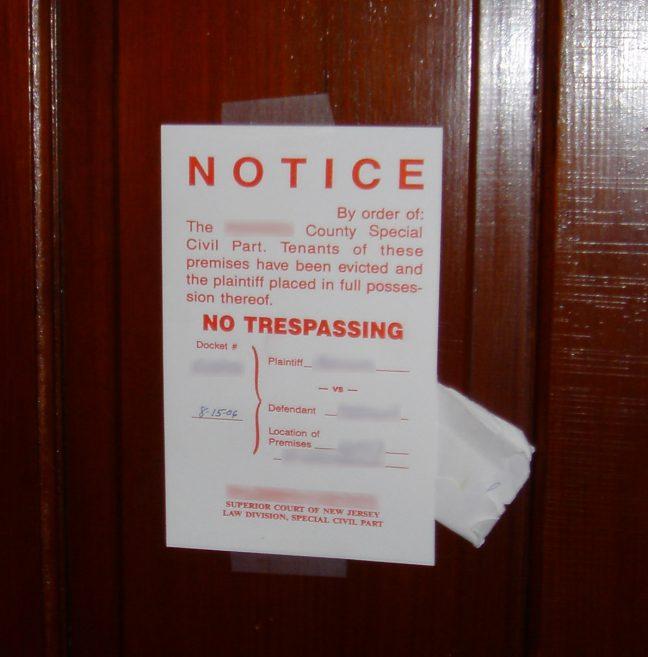A new report published by the University of Wisconsin Department of Urban and Regional Planning found non-white neighborhoods in Dane County to be the most impacted by evictions.
The report is the first of its kind in Madison, and it sheds light on an area where there is currently very little data. One of the biggest findings was the fact that race was the most important factor in explaining evictions in Dane County, Revel Sims, an assistant professor in the Department of Urban and Regional Planning, said.
In the report, which was published in October, Sims, along with graduate students and the Tenant Resource Center, researched eviction court cases in Dane County. They found there were 40,439 eviction court cases between 2000 and 2015.
The number of eviction cases city-wide increased slightly from 2000 to 2011 and decreased from 2011 to 2015. A disproportionately high number of these evictions were in neighborhoods of color.
Sims said cities in the Midwest are some of the most racially segregated in the county, which can cause issues when looking for housing.
“One of the results of racial segregation is increased housing insecurity amongst non-white renters,” Sims said. “Eviction displays much of that housing insecurity.”
Locked up and locked out: Milwaukee struggles with incarceration, eviction
According to the report, the neighborhoods with the highest number of evictions are located closest to neighborhoods with some of the highest percentages of non-white residents. The top 10 neighborhoods with the greatest percentage of non-white residents account for 6,985 eviction cases out of a total 40,439, more than 17 percent of cases in the city.
Heidi Wegleitner, public interest attorney and Dane County supervisor, District 2, said poverty can be a huge reason for evictions. She said there are fewer tenant protections, making it easier to evict people.
“I think evictions are a problem everywhere, especially in cities,” Wegleitner said. “It might be more severe in Madison because I think our disparities, our income, our wealth, our criminal justice racial disparities are higher here.”
When the state legislature changed the law to allow landlords to evict anyone based on an allegation of criminal activity, Wegleitner said it made it a lot easier to evict people. Additionally, since it became a law March 1, 2016, she said many people are still unaware of the changes and do not know their rights.
Bill on Walker’s desk would allow landlords to evict tenants for ‘criminal activity’
In the last five years, Sims said there have been a number of laws that shift power in favor of landlords. He argues it is important to address the CCAP Case Management System, which provides full case file and court calendar information.
“There should be restrictions on what CCAP records are available to landlords and which type of records,” Sims said.
There is a higher police presence in areas with people of color, which can mean more arrests and more contacts with police, Wegleitner said. She said there is a lot of communication between landlords and police.
Author of this year’s Go Big Read urges readers to fight poverty
Once a person has been evicted once, Wegleitner said, the chance of being evicted again rises dramatically.
Wegleitner said there is housing discrimination, but it is very subtle, making it difficult to prove. She said fear and mistrust can turn into grounds for eviction.
“There’s a stereotype and assumptions made about people of color,” Wegleitner said.
When it comes to legal services, Wegleitner said low income households cannot get access to them because the resources are so limited. She said she is one of few attorneys dedicated to representing low income tenants in the area.
The government funds legal services for low income people, but she said the funding is very limited and not many lawyers want to represent people for free.
Weigleitner said in the proposed budget for Dane County, there are proposals for eviction prevention assistance and tenant services to educate individuals on rights.
“The fact that it has been doubled — it was doubled last year and it was doubled this year — shows a commitment to the idea that eviction prevention assistance is needed,” Wegleitner said.
Bill on Walker’s desk would allow landlords to evict tenants for ‘criminal activity’
When it comes to the eviction report, Wegleitner said it was a great foundation for future research to see who the top evictors are and where they are occurring. She said the data identified some of the shortcomings and where there needs to be more data.
Sims said he will be continuing to work on the data by looking into more variables based on some of the criticisms.
“It’s not just a local problem, and certainly it’s hard for just the local government to respond to it, but I think people are trying to,” Wegleitner said.

















